Content Creation
How Top Brands are Accelerating SEO Content Creation with AI
By Erik Mathes on April 16, 2024
With organic search re-emerging as a cornerstone strategy for CMOs, top brands are harnessing AI to accelerate their search engine optimization (SEO) efforts and bring more efficiency to a traditionally cumbersome and resource-intensive practice.
This article explores how AI can streamline the process without sacrificing quality or strategy.
What's driving the renewed focus on organic search?
- Intense pressure to optimize spend amid economic uncertainty. With advertising costs continuing to rise, marketers are leaning again into SEO as a more sustainable and cost-effective solution to overshadow the competition, grow brand awareness, and feed the digital funnel. In fact, 90 percent of enterprise marketers reported SEO as a key focus in 2023 and beyond, according to BrightEdge.
- In an increasingly volatile digital landscape, search remains a strong channel and sound investment with 77 percent of marketers in 2023 reporting their search traffic was good or better than the year prior. At the same time, Edelman's latest Trust Barometer research cites search engines as the source consumers most trust for news and information—outstripping trust in traditional, owned, and social media channels.
- The introduction of generative artificial intelligence (GenAI) into the search experience via Google's SGE and Bing's Deep Search has caused unprecedented search ranking volatility. Marketers are working to adapt and modernize their search strategies with an emphasis on intent, contextual signals, and content diversification.
Related Article: Discover the impact of generative AI on SEO and how to align your search strategy with the latest developments.
The role of AI in SEO content creation
Amidst the resurgence of SEO, organizations must take a fresh look at their approaches to planning, creating, and managing SEO content.
While AI SEO tools have existed for some time, most platforms focus on optimizing one aspect of SEO content creation, such as keyword research or performance analytics, rather than the end-to-end creation process.
Alternatively, some emerging tools and SEO agencies propose the use of GenAI to create SEO content from scratch, bypassing the need for human creators.
This is a risky approach for several reasons:
- Quality Control: GenAI can produce content quickly, but the quality may vary significantly, often lacking the human insight, expertise, and depth necessary to satisfy users' expectations. Marketers producing AI-generated content at scale risk publishing low-quality content that damages their brand reputation and search authority scores.
- Ownable IP: Per the latest guidance from the U.S. Copyright Office, content generated by AI or originated primarily by AI cannot be verified as original and is, therefore, not able to be copyrighted or owned by your brand.
- Originality: Using AI to generate content from scratch, brands run the risk of inadvertently introducing plagiarism or producing content that very closely resembles existing material online. This can lead to copyright infringement issues and will ultimately have a negative impact on SEO rankings, as search engine algorithms become more adept at detecting (and de-ranking) unoriginal, similar-sounding content.
- Contextual Understanding: While AI algorithms are improving, they don't inherently reflect a nuanced understanding of context, tone, or cultural sensitivities. Without proper guidance and oversight, AI-generated content can easily miss the mark in terms of relevance, appropriateness, and alignment with brand messaging.
- SEO Best Practices: AI may not consistently adhere to the latest SEO best practices or understand the intricacies of search engine algorithms. Marketers must ensure that content—no matter how it's created—is properly optimized for search engines to achieve desired visibility and ranking results.
- Ethical Considerations: There are ethical concerns surrounding the use of AI for content creation, including the potential for reinforcing biases and spreading misinformation. Marketers must be mindful of these implications and ensure that AI-generated content adheres to their brands' ethical standards and values.
Moving forward, SEO content creation calls for a balanced approach, integrating the AI-powered efficiency needed to compete for search visibility and the human craftsmanship needed to rank as a quality resource.
That's why Skyword introduced Accelerator360, a tool that expedites every step of SEO content creation, from keyword research to content approval, leveraging a powerful combination of AI, human creators, and, editors. The result? High-quality, data-driven SEO content created at unprecedented speed and scale.
Let's examine how Accelerator360 optimizes and automates the manual steps that bog down traditional approaches to SEO content creation.
1. AI-enabled keyword research
In-depth keyword research is crucial for SEO, but getting it right can be time-consuming and costly—especially if your brand is reliant on an array of SEO tools and specialists to get the work done.
It's also common for keyword research to be misaligned with business objectives. Traditional methods involve sifting through vast amounts of data to identify high-volume search terms with limited degree of difficulty for ranking, leading many brands to fixate on terms that are likely to drive the most traffic versus those that are likely to drive the most qualified traffic or give them a strategic advantage versus competitors.
Accelerator360 helps you discover more strategic search terms in two powerful ways:
- Uncover what's working for your top competitors: Analyze your toughest competition to identify high-performing keywords and content themes where they outrank your brand.
- Tap into trending topics: Discover rising search terms within your category or a target niche, allowing you to position your brand at the forefront of relevant conversations.
To gain a quick competitive advantage, simply create a new Acceleration in Accelerator360 and input your most relevant business and media competitors.
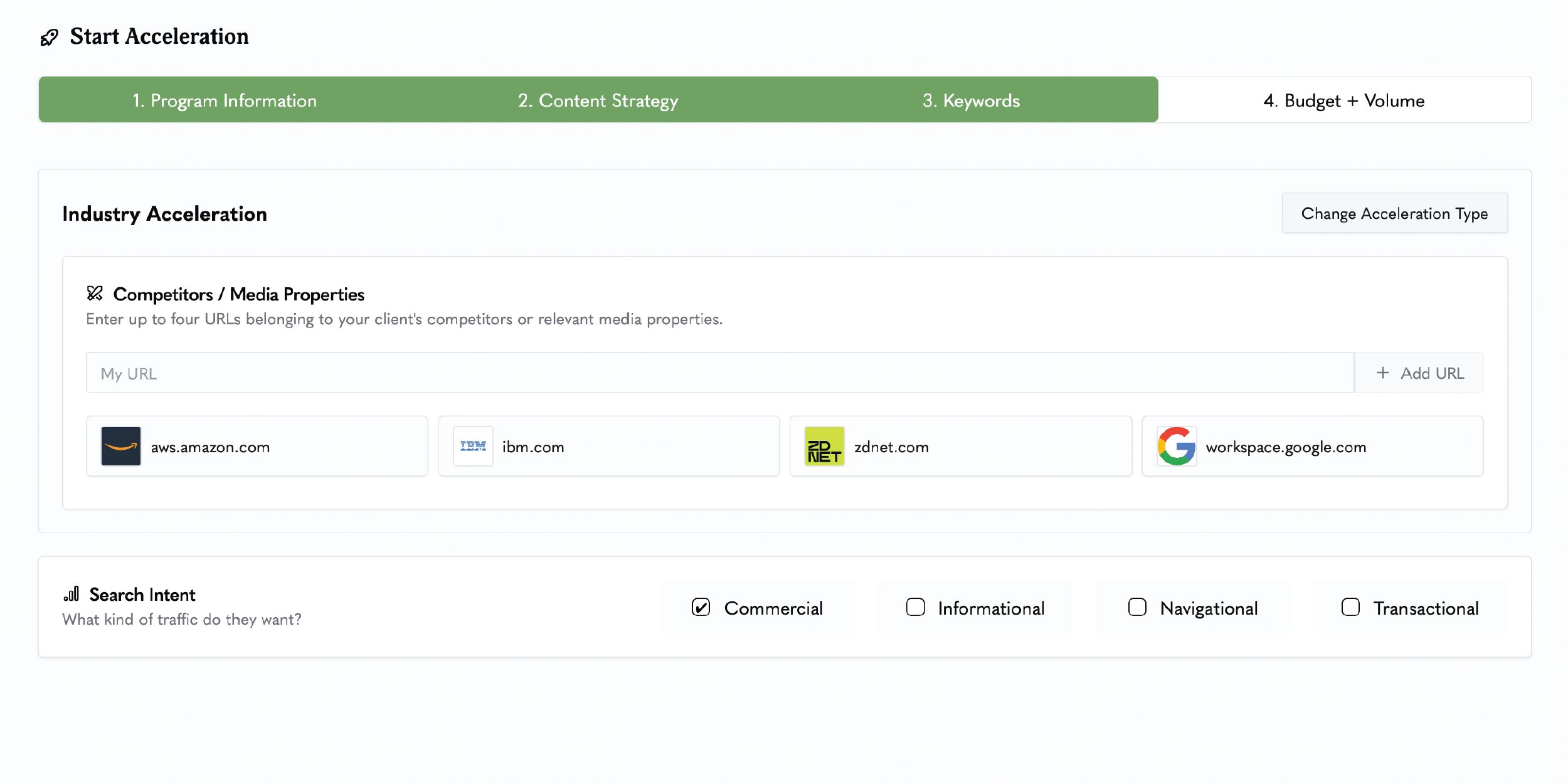
By analyzing your selected competitor set, Accelerator360 uses a combination of real-time search data and intelligent automation to surface the keywords their sites are outranking you on and where (if at all) your brand falls in the mix.
Once you see which terms your competitors are outranking you on, you can easily expand to view related terms, select which keywords you'd like to prioritize building content around, and start systematically stealing that qualified traffic with targeted content.
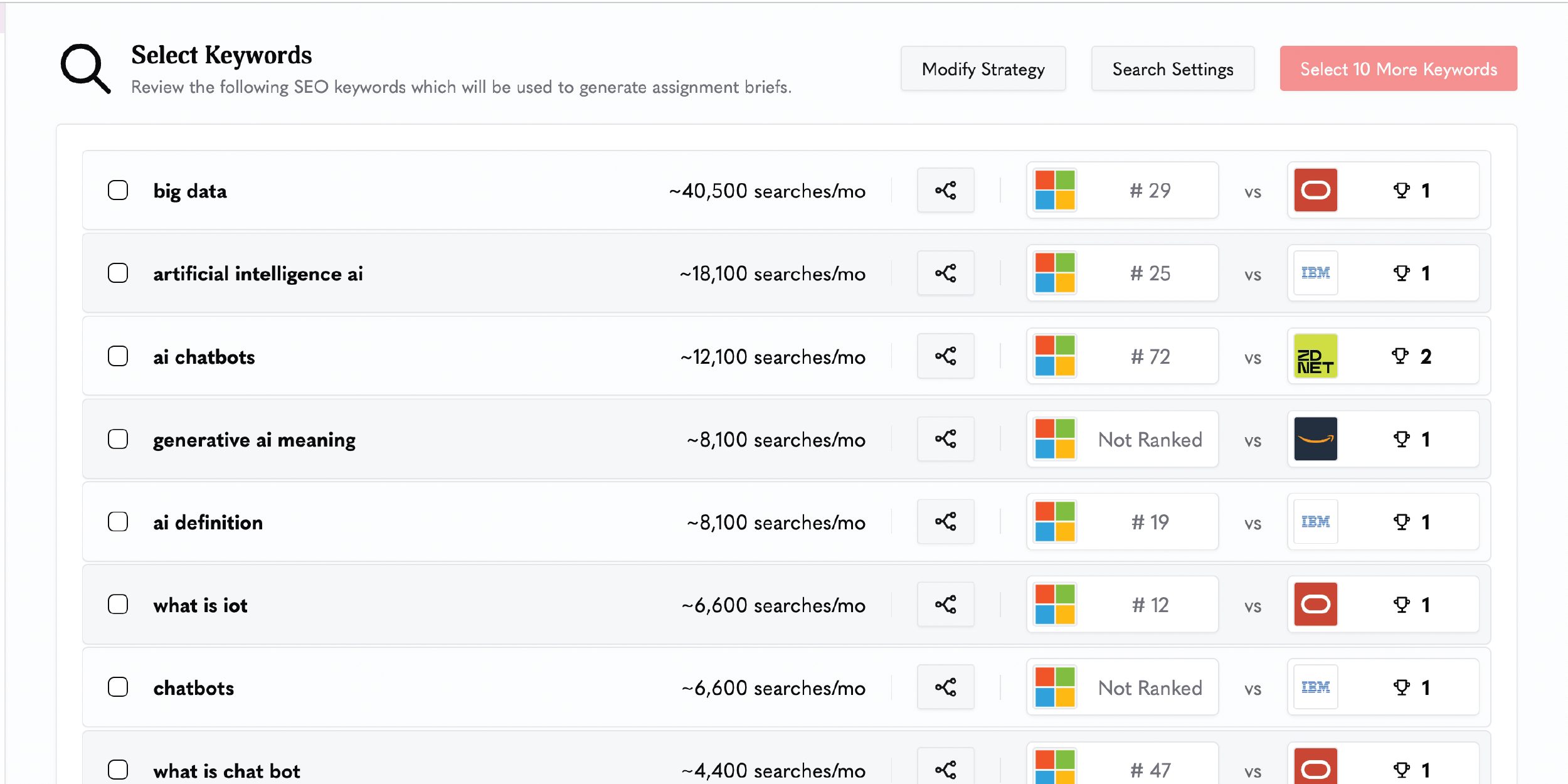
2. Aligning SEO content with audience intent and brand priorities
Too often brands create content targeting the right keywords, but the wrong searches. While content optimized for broad keywords might rank well, it often attracts the wrong kind of traffic—users who aren't your ideal customers. The result is wasted time and effort.
Today, it's more important than ever to create SEO content that's aligned with your target audience's search intent—the underlying reason behind their search query. As user searches become more specific, search engines have gotten better at understanding searcher intent using advanced techniques. To be the top result for relevant searches, your content needs to be the best fit for the specific topic your target audience is researching. Are they in the early stages, seeking basic information? Are they comparing products or ready to make a purchase? Each stage requires different information.
High-impact content considers both user intent and your brand's unique selling points. For example, a brand like Microsoft might be steered towards a frequently-searched topic like "What is Cloud Computing?" However, it's reasonable to assume the article won't attract IT professionals already familiar with the concept.
A much better use of Microsoft's resources would be to create content on a topic like, "Maximizing Business Value: Understanding Cloud Storage Costs." The subject of this article speaks directly to their ideal customer's needs and a key benefit they want to raise awareness of (cost-effective cloud storage).
Accelerator360 uses GenAI to automate this process, generating a list of content ideas tailored to your target keywords, aligned with the user intent you're targeting, and specific to your brand's priority themes. This helps you create content that not only ranks well, but resonates with your audience and solutions to drive conversions.
When you start an Acceleration with Accelerator360, you'll input your brand's Purpose, Themes, Audience, and set your target Search Intent as one of the following:
-
Commercial
-
Informational
-
Navigational
-
Transactional
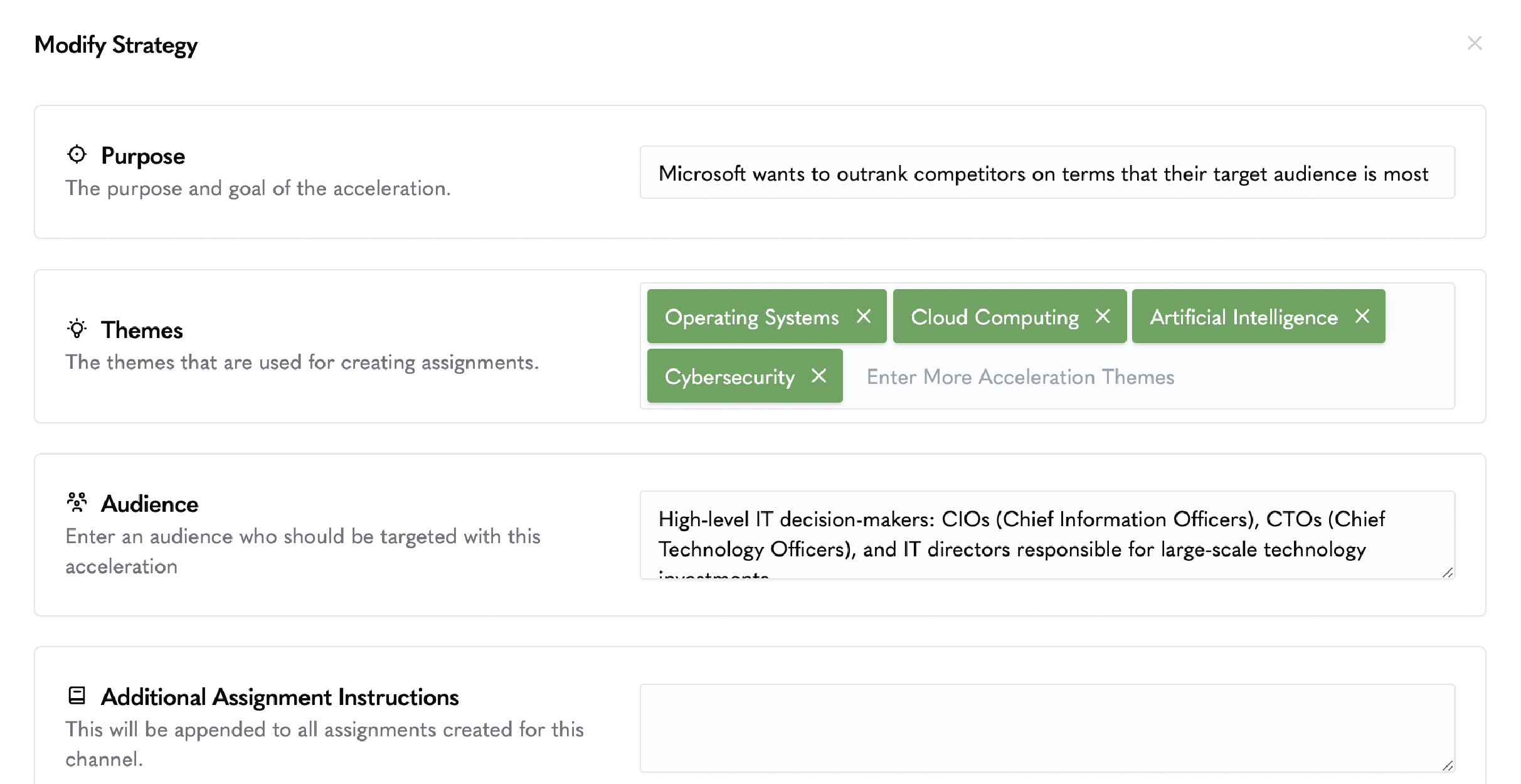
3. Auto-generating briefs that ensure content will actually rank
Creating content briefs is a complex task that poses significant challenges for marketers. This process typically entails:
- Identifying the questions and topics relevant to the audience, guided by their search intent.
- Performing a competitive analysis to ensure that your content surpasses competitor content.
- Taking into considering how the content aligns with and supports the brand's strategic objectives.
Content briefs are essential for guiding creators, but crafting them takes time, and ensuring the details are correct is crucial. Vague or misaligned briefs can lead to content that misses the mark, wasting resources and opportunities to drive your audience deeper into the funnel.
Accelerator360 uses GenAI to auto-generate thorough content briefs that not only reflect the purpose behind each assignment, but outline what the content should include, informed by analysis of the top five pages currently ranking for the topic.
This sets your team up for the next step in the SEO content creation process: finding the right topic expert to complete the assignment.
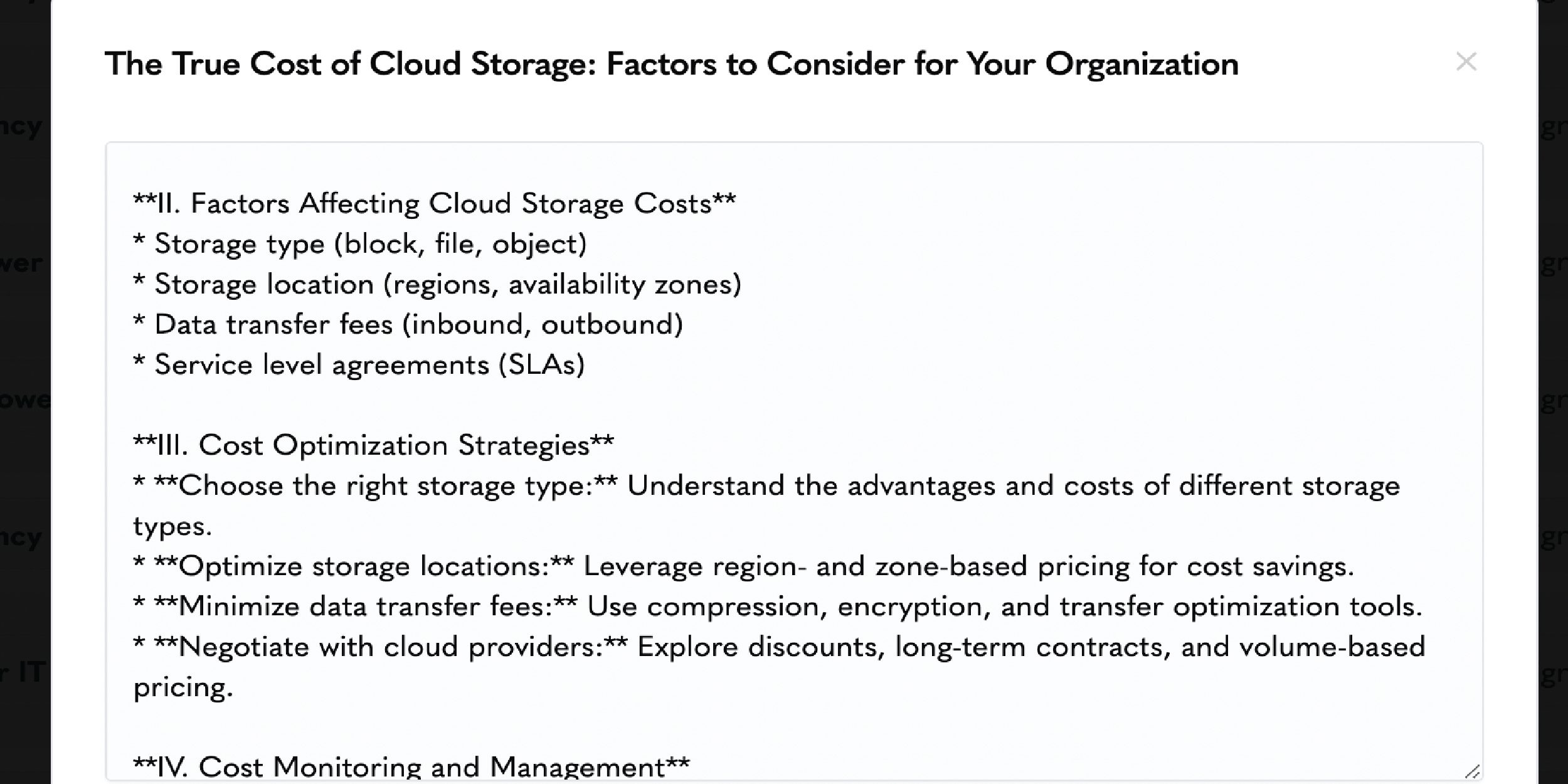
4. Tapping into high-quality content creators at speed and scale
Digital marketing demands a consistent stream of high-quality content, which places considerable pressure on marketing, whether it's navigating the complexities of coordinating with freelance content creators or struggling to hit targets with limited in-house resources.
Managing freelancers directly makes it more difficult to ensure quality, maintain a consistent brand voice and tone, and meet deadlines as content needs grow. With an in-house team, finite resources and limited bandwidth and expertise can hinder the ability to produce varied and specialized content at the pace required to compete effectively.
The rush to produce output frequently results in content that lacks the depth, authority, and originality necessary to deliver meaningful results. As search becomes more competitive and AI-generated content floods the internet, originality and expertise are more imperative than ever for brands looking to achieve meaningful quality and authority scores when creating content at scale. On the flip side, content that sounds too much like what's already out there—and fails to add any value to the conversation—will be penalized by search algorithms and result in a drop in rankings.
Accelerator360 addresses these challenges by using AI to auto-recommend the most suitable creators for your assignments from Skyword's global talent network, introducing more speed into the creation process while maintaining an emphasis on high-caliber talent and depth of expertise.
First, Accelerator360 simplifies the task of finding the right content creator for each assignment by automatically surfacing writers whose samples and credentials align with the specific needs of the content brief.
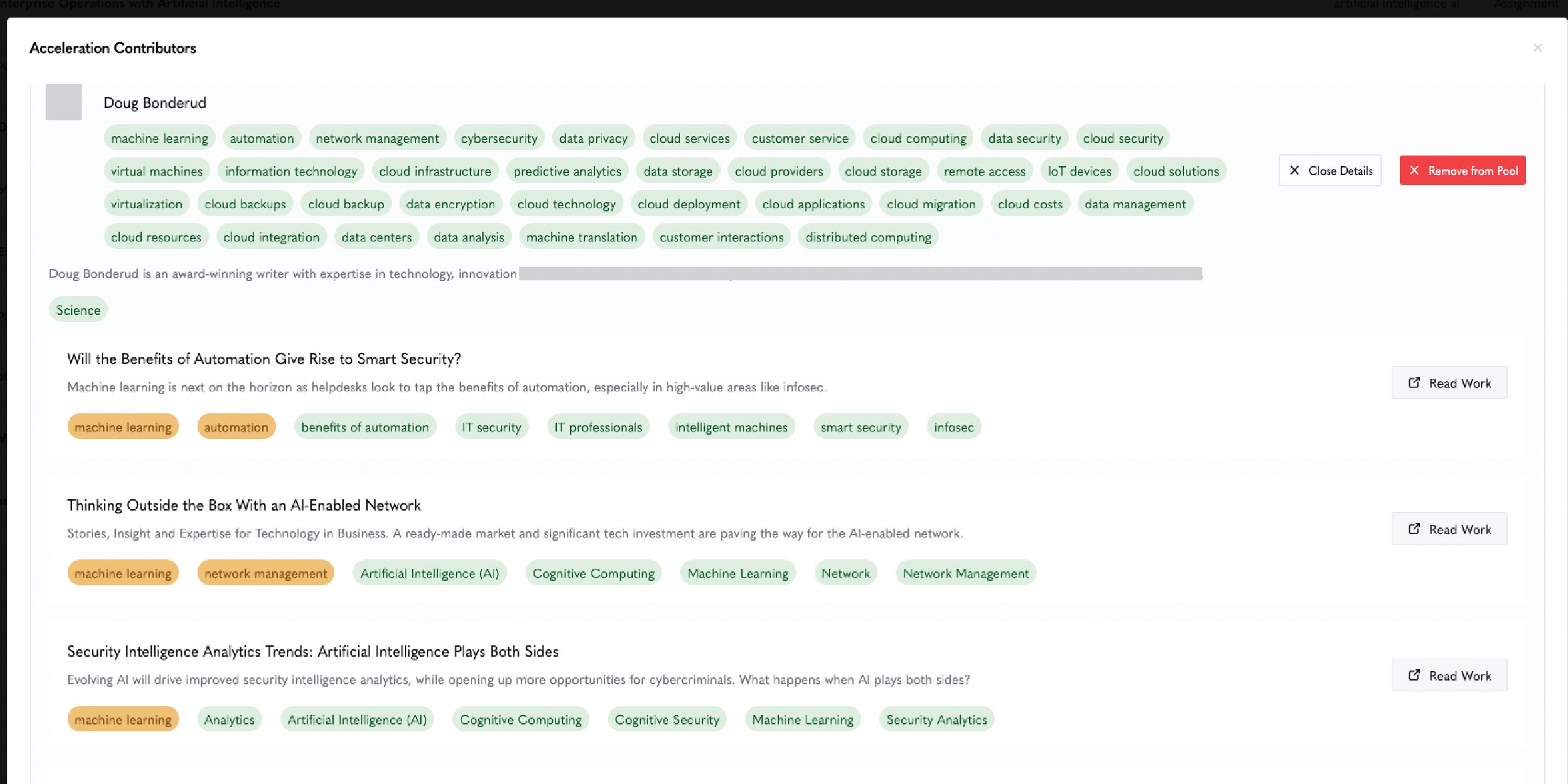
Further enhancing efficiency, Accelerator360 expedites the assignment creation process. You can either open assignments directly to a selected creator or issue a Request for Proposals (RFP) to multiple freelance creators simultaneously to have them bid on and submit proposals for your assignments.
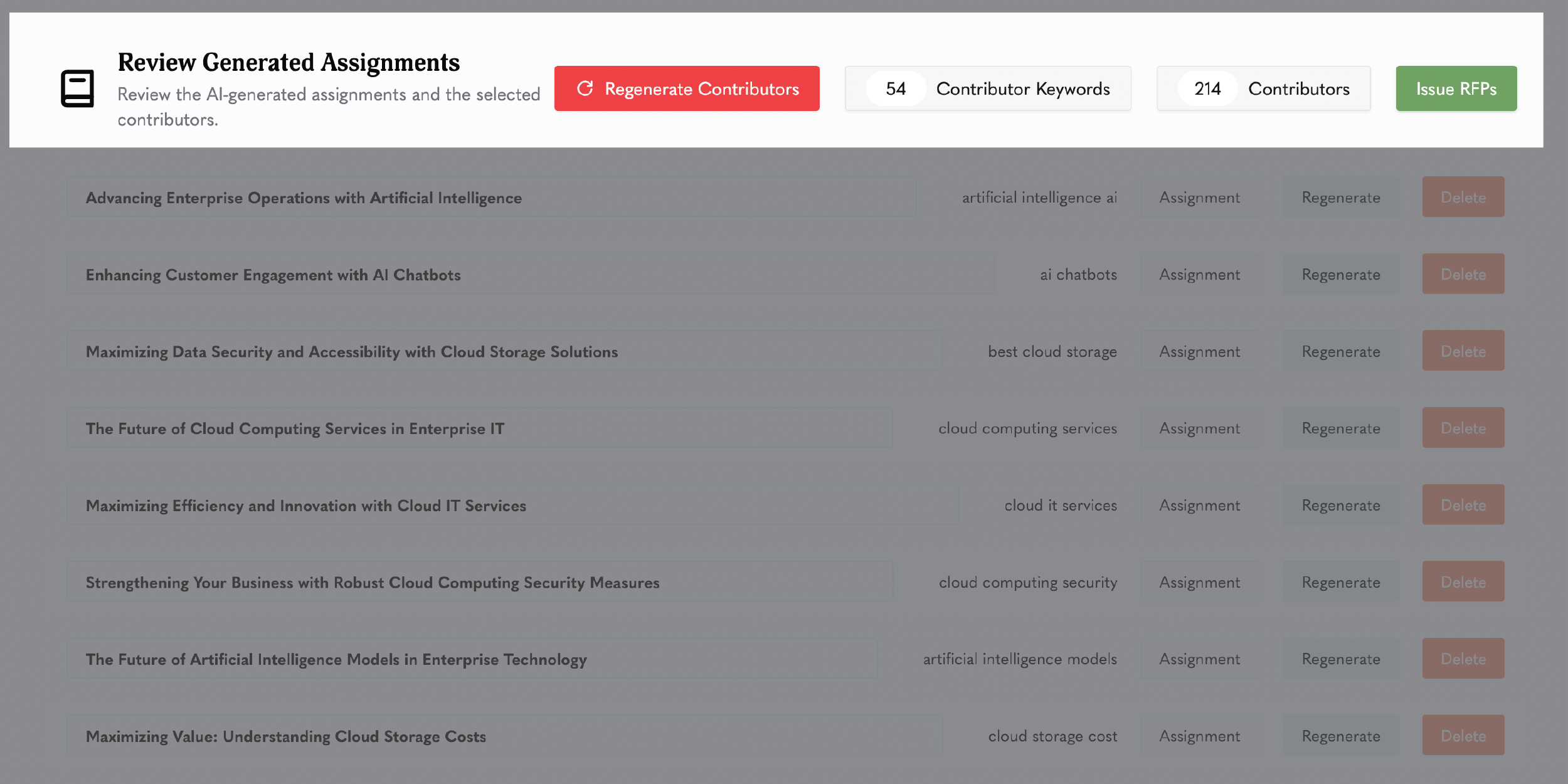
On top of showing the rate each freelancer would require for your assignment, Accelerator360 will send automatic follow-ups to freelancers to submit proposals ahead of your RFP's deadline.
5. Ensuring speed to market to secure search momentum
Publishing a consistent flow of fresh content is crucial for building and maintaining search momentum, keeping audiences engaged, and staying ahead of competitors. But achieving and maintaining a regular publishing cadence presents a significant challenge for many brands, as the content creation process involves multiple steps and stakeholders, each potentially introducing delays.
Coordination between creators, editors, and reviewers, adherence to brand guidelines, and ensuring content quality can all slow down the process, making it challenging to maintain the pace necessary to achieve maximum search gains.
In a digital landscape where timing can be as critical as content quality, these delays can be costly, affecting your brand's visibility and ability to capitalize on current topics or trends.
Accelerator360 addresses these challenges by automating the content creation workflow from brief creation and assignment distribution to editing and final approval, ensuring a smoother path from ideation to publication.

On top of accelerating content production, Accelerator360 enhances team collaboration. All users are aware of their timelines and can plan their work accordingly thanks to clearly set deadlines within the platform and automatic reminders to enforce them.
The tool also facilitates a more collaborative and efficient editing environment similar to Google Docs. Creators and reviewers can work on content simultaneously in a secure, controlled, and flexible interface. Real-time collaboration allows for immediate feedback and revisions, significantly reducing the time typically lost to back-and-forth emails and disjointed revisions.
Human editing is also augmented with AI to introduce additional safeguards including automated checks for plagiarized text and AP or Chicago style.
Maximize search ROI with smart, accelerated content creation
The streamlined content creation process offered by Accelerator360 doesn't just ensure speed to market—it helps enhance your brand's search ROI.
By correcting common pitfalls in your content creation and distribution process, and implementing Accelerator360's time-saving system, your brand can produce high-quality content that's strategically aligned with your SEO goals in less time and with less effort.
This efficiency leads to faster-compounding returns since content that is both relevant and timely can significantly improve your brand's overall search authority and expand your digital footprint more effectively.
Don't let bottlenecks and inefficiencies hold back your content strategy.
Discover how Accelerator360 can help transform your approach to managing the SEO content creation process, boost your brand's visibility and relevance, and engage important audiences across the competitive digital landscape with organic search.

